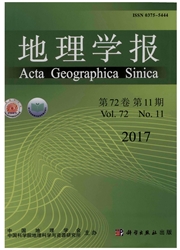

 中文摘要:
中文摘要:
中国的快速城镇化进程伴随着经济总量与用水总量的持续增长以及严重的城市缺水危机,然而三者之间的定量关系及内在机理尚不完全清楚。本文构建了城镇化驱动经济与用水增长的完全分解模型,定量测度了中国以及31个省级行政区1997-2011年城镇化过程对经济增长与用水变化的驱动效应。结果表明:1中国城镇化对经济增长的综合贡献率长期稳定在30%左右,经济增长60%以上依赖于生产效率的提高,因此应适当弱化"城镇化是经济增长主要动力"的理念;2中国城镇化虽然通过拉动经济增长增加用水2352×108m3,但通过优化产业结构和提高用水经济效率减少用水4530×108m3,中国用水增长的原因是由于人口和经济规模效应而不是城镇化效应;3中国东中部的人口和经济大省且处于城镇化加速阶段的,城镇化拉动经济并造成用水增长的作用大,但减量效应也大,而且均呈逐年增长趋势,最终城镇化对用水的综合驱动以减量效应为主,而且在时空变化上的差异相对缩小;4城镇化虽有助于减少全国或较大范围区域的用水总量,但会导致城镇建成区或城市群地区的缺水危机,因此应尽快建立并完善城乡之间(或城镇化水平较高与较低地区之间)的水资源流转机制与补偿机制。
 英文摘要:
英文摘要:
China's rapid urbanization is accompanied by a continuous growth of economy and water use, and also a severe urban water crisis. However, the quantitative relationships and the interaction mechanisms among urbanization, economic growth and water use change are still unclear. To measure the exact driving effects of urbanization on economic growth and water use change, a complete decomposition model was established, and was applied in China and its 31 provincial administrative regions from 1997 to 2011. Results show that: (1) China's urbanization contributed about 30% of economic growth every year. More than 60% of economic growth relied on the increase of production efficiency. Therefore, such idea that urbanization is the engine or major driving force of economic growth may be properly weakened. (2) China's urbanization increased 2352×1083 of water use by intensifying the economic aggregate. However, it decreased 4530 × 1083 of water use by optimizing the industrial structure and improving the water use efficiency. Therefore, urbanization did not lead to water use growth. The cause for China's water use growth was the increase of population and economy. (3) In those provinces which are located in the eastern and central China, have large population and economy, and step into a period of accelerating urbanization, urbanization generally made great contribution to economic and water use growth. At the same time, it also had great contribution to industrial restructuring and water use efficiency improvement, and then largely decreased water use. In total, water use was decreased by urbanization in most provinces, and the spatio-temporal differences among them were lessened. (4) Although urbanization helps to decrease water use for China or a large region, it may cause water crisis in urban built-up areas or urban agglomerations. Therefore, the transfer and compensation mechanisms of water resoureces should be constructed as soon as possible between urban and rural areas, or low and high d
 同期刊论文项目
同期刊论文项目
 同项目期刊论文
同项目期刊论文
 期刊信息
期刊信息
